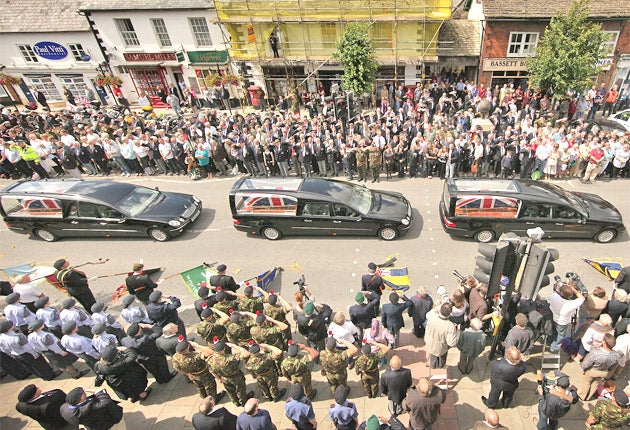The end of an era as Wootton Bassett reverts to obscurity

Your support helps us to tell the story
From reproductive rights to climate change to Big Tech, The Independent is on the ground when the story is developing. Whether it's investigating the financials of Elon Musk's pro-Trump PAC or producing our latest documentary, 'The A Word', which shines a light on the American women fighting for reproductive rights, we know how important it is to parse out the facts from the messaging.
At such a critical moment in US history, we need reporters on the ground. Your donation allows us to keep sending journalists to speak to both sides of the story.
The Independent is trusted by Americans across the entire political spectrum. And unlike many other quality news outlets, we choose not to lock Americans out of our reporting and analysis with paywalls. We believe quality journalism should be available to everyone, paid for by those who can afford it.
Your support makes all the difference.The repatriation flag will be lowered for the last time in Wootton Bassett tonight. As the sun sets, the church bell will toll to mark the end of an era for a town that has become synonymous with the death of British servicemen and women.
For 80-year-old former sergeant major, Percy Miles, the man who inadvertently started a phenomenon when he paused to honour the coffins of two young men, it will be difficult.
"It is very hard to see," he said. "But what has got to be, has got to be."
The same quirk of geography that thrust a town off the M4 into the national spotlight will send it back to obscurity tomorrow, when repatriations are moved from RAF Lyneham in Wiltshire to RAF Brize Norton in Oxfordshire. The route to the John Radcliffe Hospital in Oxford will no longer pass through Wootton Bassett. Instead the crowds and television cameras will turn up in Carterton. Paul Chilvers, manager of the newsagent across from a now famous war memorial, said: "It is an adopted way of life and now it has moved on. There is a quietness about the town. It is subdued."
It was in April 2007, that a technical fault on an RAF plane bringing two soldiers home from Iraq meant that it arrived late, coinciding with the church bell ringers' Monday night gathering. As the hearses passed through, they decided it would be inappropriate to practice and just tolled the bell.
Then Mayor Percy Miles and fellow members of the Royal British Legion noticed and stood in silent salute.
The impulsive act touched a nerve. Within a short while hundreds descended from across the country to mark repatriations.
In the Conservative Club, pensioners conceded they felt guilty the end of such a tragic event would be a loss.
"It is going to leave a void in our lives. Maybe it will hit home when another soldier is killed that we have not got them coming through here," added former WRAF air traffic controller, Elaine Cobb.
The town has had a reprieve from the disastrous economic impact of the closure of RAF Lyneham. Plans were announced last month to replace it with a tri-service military training facility, which will keep some military personnel and their families in the area. Others admitted to relief that the sight of families' grief would no longer be on their doorstep.
Roger Haydock, who has tolled the bell for most of the repatriations, said: "Personally, it is a relief because it has felt quite a responsibility at times.
"Unlike most of the population, you don't miss a single repatriation and the people of Wootton Bassett are much more aware of every one. That can be depressing."
One pensioner said: "I didn't come down to the repatriations. It was full of coach loads who turned up from around the country; people who stood there with a beer in their hands."
Reverend Canon Thomas Woodhouse insisted tonight's ceremony would be "understated and low key".
He explained: "When you are getting on with the job, you are planning for the next one all the time. Only now can we spend time reflecting and making sense of what we have done.
"Now we can talk through what it has meant to us. I think because it has not gone to people's heads – because we have not started thinking of ourselves as special – life will be able to carry on after tomorrow as it always had before."
After 167 repatriations, the flag will be lowered and placed in St Bartholomew & All Saints church, before being handed over to Oxfordshire, along with the responsibility of honouring the nation's war dead.
Join our commenting forum
Join thought-provoking conversations, follow other Independent readers and see their replies
Comments